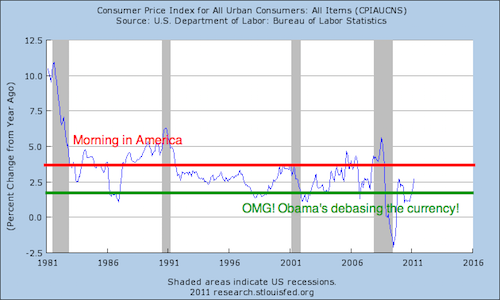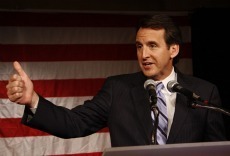Matthew Yglesias's Blog, page 2281
June 8, 2011
Newt Gingrich Thinks High-Inflation 'Reagan-era Monetary Policies' Would 'Strengthen The Dollar'
Odd monetary policy ideas are coming so fast and quickly from the right these days that I can't quite tell if Newt Gingrich's notion that we ought to be "returning to the Reagan-era monetary policies" is a great idea or a terrible one. The problem is that rather than proposing this as an effort to boost employment, Gingrich says we should "strengthen the dollar by returning to the Reagan-era monetary policies that stopped runaway inflation and reforming the Federal Reserve to promote transparency."
The problem, as we've seen before, is that a review of 30 years of inflation history makes it clear that Reagan-era policies featured much higher inflation than Obama-era ones:

Now by my lights, this is a perfectly good idea. A wide range of economists from Paul Krugman, Olivier Blanchard, and Mark Thoma on the left to Greg Mankiw, Tyler Cowen, and Scott Sumner on the right think that setting a 4 percent inflation target will stimulate real output and reduce unemployment. Indeed, Federal Reserve Chairman Ben Bernanke himself agrees that this would work, but refuses to do it anyway. Under the circumstances, political pressure for a return to "Reagan-era monetary policy" could do a lot of good.
Conversely, if by "Reagan-era monetary policy" Gingrich means that we need to stop "runaway inflation" then of course the question is what runaway inflation is he talking about. Inflation is much lower than it was during the late Reagan years, and wildly lower than it was when Reagan took office.


Arab States Need Real Economic Reform

By Matthew Cameron
President Obama and other G-8 leaders announced last month that they are planning to offer $20 billion worth of financial assistance to the post-Arab Spring governments of Egypt and Tunisia. Columbia University economist Edmund Phelps notes, however, that those nations need more than just foreign investment and debt relief. They also must reform abusive regulations that allowed previous leaders to distribute economic opportunities as a form of patronage to regime insiders:
"The young protesters of the Jasmine Revolutions of Tunisia and Egypt, many of them university graduates, overthrew the old regime because it impeded or blocked them from careers that would offer engaging work and the chance for personal growth. The protesters did not demand more creature comforts or better infrastructure; they demanded opportunities to make something of themselves.
These young Arabs were being stymied in two ways. To get any good job required connections with insiders, something that ordinary young people could not acquire. And securing some type of self-employment, such as selling fruit and other goods on the street, required licenses, which were limited."
This is something that donors and Western nations need to keep in mind as they follow through on their aid pledges in coming years. Both Egypt and Tunisia have large numbers of young people and many of those individuals are educated, at least through the secondary level. Although their skill levels may not be on par with those found in Europe and the United States, it certainly seems reasonable to believe they are capable of owning and operating food stands from which they can earn steady incomes. But if arbitrary barriers to entry persist, then no amount of financial aid is going to produce sustainable employment growth among the youth segment of the population. In fact, aid money without attendant economic reforms could make life even more difficult for young job-seekers since it will merely reinforce the strength of entrenched interests. That might be a good way to provide financial security for Egyptian and Tunisian elites, but it's bad for promoting development among the citizenry as a whole.


Chinese Port Operator Crushing Greek Labor

There's a kind of Greek deli place near the office called Port of Piraeus, which also turns out to be the name of a very real port in Greece which was recently leased by the Chinese port operating firm Cosco. Their key business innovation has been to import more Chinese-style working conditions:
He says workers were told by supervisors to urinate into the sea, rather than taking toilet breaks. Those operating straddle carriers had to take cups up into their cabins to urinate into, and he says they were not given breaks, either, despite the clear dangers of operating at such a height for so long.
The worker says he was paid 600 euros a month — about 50 euros each shift — around half the salary at the neighboring Greek-operated pier, with no extra money for working night shifts or weekends. There was no set schedule; he was kept on 24-hour call for nine months.
That's ugly stuff. But Greece has taken a big negative shock to its economy. And without the possibility of spreading the pain around with a currency devaluation, tons of people have been thrown out of work. Then the austerity budgeting has created a big secondary shock leading to more joblessness. The upshot is a big pool of people for whom, much like Chinese people, these bad working conditions are worth putting up with. This wouldn't have been fully avoidable under any policy dynamic, but austerity fervor and the huge structural problems with the euro are making it much worse than it needs to be.


In Defense Of Vague Campaign Plans

Jon Cohn notes the contrast between Tim Pawlenty's hand wavy economic policy agenda and and the wonky proposal rolled out by 2008 Democratic contenders:
The contrast to the environment for Democrats seeking the presidency is fairly stunning. At this point four years ago, John Edwards and Barack Obama had put out detailed health care plans that had realistic assumptions, vetted by economists and health care experts, and actually looked pretty similar to what eventually became the Affordable Care act. Hillary Clinton would soon do the same. By the time the primary season was over, all three had also put out detailed plans on the economy and foreign policy.
They were running for president and so, no, they didn't tell every "hard truth." Their numbers didn't always add up and some of their boasts turned out not be true. But, by and large, Democratic domestic policy proposals were both more detailed and more realistic than anything we're seeing from the Republicans, partly because Democrats knew analysts would demand rigor and partly because they understood these plans could become templates for actual governing.
Pawlenty's speech was indeed full of nonsense and fuzzy math but I wouldn't get too nostalgic about Democratic plan-mania. To me, the main consequence of that business was to raise unrealistic expectations and lay the groundwork for unfair backlash when it turned out that in the United States of America laws are written by congress.
To me, I learned from Tim Pawlenty what I wanted to know. His speech made it clear that he agrees with the George W. Bush approach and will seek to push tax revenues to the lowest legislatively feasible level, with a special eye toward the tax burden on high-income individuals and corporations. The "plan" he outlined is thrice as costly as the Bush tax cuts, and though unrealistic that alone tells us about the direction he'll try to take the country.


New Frontiers In Over-Complicated Hamburger Cookery
For a while now, I've thought Richard Blaise's hamburger cooked sous vide and then blowtorched was the prize winner for most over-complicated burger around:
But Nathan Myhrvold is pressing the boundaries further:
First, put the beef patty in a plastic bag and cook it sous vide — immersed in warm water for about half an hour until the core temperature reaches about 130 degrees. Next, dip the patty in liquid nitrogen for 30 seconds to freeze the outer millimeter of the meat, and then deep-fry in 450-degree oil for one minute.
"The freezing followed by the burst of high heat lets you brown the outside without overcooking the inside," Dr. Myhrvold said. And the deep-frying is supposed to be a technological improvement over the classic White Castle spatula-on-a-griddle technique.
I'll stand by Ray's Hell Burger in Northern Virginia where to the best of my knowledge they obtain quality beef, season it a bit, and cook it in a pretty normal way. Delicious!


Performance Pay For Drugmakers

You tend to find the most interesting political stories in business sections, since there's less of a commitment to "balance" and more of an effort to explain what's actually happening. So I really liked this piece by Naomi Kresge and Allison Connolly about new German legislation to introduce performance pay for pharmaceutical companies that want their medicines to be eligible for coverage:
AstraZeneca (AZN) recently set the price of its new Brilique blood thinner, which it hopes will become its next blockbuster drug, at €1.69 ($2.38) per pill in Germany. Whether it will be allowed to maintain that price in Europe's largest drug market remains to be seen. The British drugmaker, insurers, and German regulators are bracing for a yearlong battle over the medicine's value, the first test of a new pricing law in Europe's biggest economy.
What makes the legislation so wrenching for Big Pharma is that drug companies previously needed to show only that a drug was safe and worked better than a placebo. Now the onus is on companies to prove not just that a drug works but that it is actually worth more than older therapies. If a drugmaker can't convince German regulators that its compound has greater efficacy or additional benefits, then it cannot charge more than rival medicines already on the market.
Established institutions generally dislike any change to their existing compensation systems, because things are naturally run by people who are well-adapted to the current system. But this is a change that not only should save some money by reducing expenditures on bad drugs, it should also change the nature of the drugs that get into the pipeline over the long term. Right now companies have a lot of incentive to let marketing and intellectual property considerations drive R&D. If you can produce a new drug in a category full of generics, get the patent, and market it to health providers as "new" and "better," then you're in a position to make money whether or not it's actually new or better. Patients tend to trust what doctors tell them (even if it's totally wrong) and practicing medical doctors aren't research scientists doing independent inquiries into whether these things really are new and better.
But if pharmaceutical companies actually make more money with drugs that are actually better than they do with drugs that they just market better, this changes incentives and research priorities. The question, as ever when trying to design incentive programs, is whether or not the people in charge of doing the assessment actually know what they're doing and have a workable system in place.


Money Doesn't Grow On Trees, But The Government Has An Unlimited Supply Of It

Yesterday on Twitter, I gave the short version of my theory of fixing the economy: "If people had more money, they'd buy more stuff, and more people would have jobs."
I spelled out why I think giving people more money would lead to more spending and more employment here, but that Tweet prompted a telling objection from Sam Sherraden who asked "How about starting with 'if ppl had more/better jobs they'd have more money.'"
His way sounds commonsensical to people, but it's actually wrong. It's true that if any given unemployed person had a job that he would have more money. It's also true that if any given employed person got a higher paying job, he'd have more money. But it's false that if the unemployment rate were lower, people in general would have more money overall. Society as a whole would have more real goods and services if there was less unemployment and more work happening. When people do useful work, that creates real output. But it doesn't create money. The government creates money. Which is why the correct policy analysis starts with the observation that if people had more money they would buy more goods and services and more people would have jobs. More money would, in other words, lead to more output of real goods and services.
This is very unintuitive, I realize, and it's actually one reason I try not to spend too much time speculating as to why Washington doesn't do anything about unemployment. Part of the reason, I suspect, is that lots of important politicians, interest group leaders, media celebrities, etc. don't understand this correctly. But if you have a country with lots of able-bodied people who aren't working, lots of retail spaces and office buildings that are vacant, lots of construction equipment that's not in use, and lots of factories that aren't running at full tilt, then you can increase real output by putting more cash into people's hands or by decreasing their indebtedness.


Origins Of The Mistaken Pivot To Deficits
Zachary Goldfarb has a fascinating piece looking at Treasury Secretary Timothy Geithner as the main architect of the mistaken decision to turn the corner and start focusing on deficit reduction rather than jobs:
By early last year, Geithner was beginning to gain the upper hand in a rancorous debate over whether to propose a second economic stimulus program to Congress, beyond the $787 billion package lawmakers had approved in 2009.
Lawrence Summers, then the director of the National Economic Council, and Christina Romer, then the chairwoman of the Council of Economic Advisers, argued that Obama should focus on bringing down the stubbornly high unemployment rate. This was not the time to concentrate on deficits, they said.
Peter Orszag, Obama's budget director, wanted the president to start proposing ways to bring spending in line with tax revenue.
Although Geithner was not as outspoken, he agreed with Orszag on the need to begin reining in the debt, according to current and former administration officials. Some spoke for this article on the condition of anonymity to discuss internal deliberations.
The real mistake here, though, was made by the president. Having people on your staff who share common values but have a range of views is a good idea. But this is an issue that's much more in the Romer/Summers wheelhouse than Geithner's or Orszag's. The ultimate decision was probably over-determined, with it seeming to other members of the team that there was no legislative path forward for additional stimulus so that becoming optimistic about the confidence-boosting potential of releasing deficit plans was mentally pleasing. In general, the Obama administration stands out for having at times a weak grasp of the non-legislative functions of the presidency and doesn't seem to spend much time worrying about Fed appointments or stimulative things executive agencies can do.


Mitt Romney Defends Abortion Flip-Flop By Noting That Ronald Reagan And George H.W. Bush Did It Too
I believe it's David Frum who's noted that one reason Mitt Romney has such a hard time shaking his reputation as a flip-flopping panderer is that he's actually not very good at pandering. For example, when pressed last night by Piers Morgan about why he changed his view on abortion, he simply noted that other Republican Presidents had also made this flip-flop so why should it be held against him?
MORGAN: I mean you're aware it's a very, very hot issue in America, certainly for politicians. And that your critics jump on that as one of the examples of you being just a flip-flop. How do you — how do you counter that, given your view has changed so dramatically on that one issue?
M. ROMNEY: Well, Ronald Reagan was also pro-choice and then became pro-life. And George Herbert Walker Bush was pro-choice and became pro-life. And they became pro-life as they took the responsibility of — of leading. And — and in that circumstance, they recognized that they…
MORGAN: How many times –
M. ROMNEY: — they did not — they could not simply sign up for — for the taking of unborn life.
Part of the reason this is less forgivable is simply that it's a later period in time. When the question of abortion exploded unto the national political scene in the late 1960s, it was a completely new issue that bore no fixed relationship to traditional ideological cleavages in America. What's more, it hit the agenda at a time when the parties were already engaged in substantial realignment driven by the decline of the Democratic Party's white supremacist faction. Under the circumstances, a lot of politicians of a certain age wound up needing to flip their position in order to bring themselves into line with the partisan/ideological alignment that solidified in the 1980s wherein in came to be taken for granted that support for criminalizing abortion "goes together" with support for low taxes, high military spending, and opposition to environmental regulation and labor unions.
Mitt Romney is a different character. By the time he ran for governor of Massachusetts in 2002, it was already well-established that conservatives are against legal abortion. And when Romney was running, there was no denying that he was in general more conservative than Shannon O'Brien. But the perception that he might be less pro-choice than O'Brien was deadly in the eyes of many otherwise Romney-friendly voters. Consequently, he found himself angrily denying that he was even slightly less pro-choice than O'Brien, and indeed offered what I think is one of the most passionate defenses of abortion rights I've ever heard from a male politician:
This is the question Romney is being asked to answer. He seems to have felt quite strongly about this issue in 2002, but then by 2008 claimed to feel quite strongly about it on the other side. Now common sense indicates that if elected President Romney would "stay bought" on this issue and govern as an abortion opponent. To me, that should be good enough for non-fanatics on either side to make up their mind. But if people are interested in "character" questions, this is what I mean about judging character based on someone's career.


One Lesson From Germany Is That Good Policy Doesn't Always Pay Off Politically

David Leonhardt has a smart piece assessing some of the things Germany's been doing right. He has Gerhard Schroder's Agenda 2010 reforms on the list:
Specifically, the government took a fresh look at people who had not worked in years to determine who could and couldn't work. The able and healthy were matched with potential employers. If they took a low-paying job, which was often the case, they would still receive a small portion of their benefits for a time. If they refused to work, their benefits were reduced anyway.
"The incentives to take up work were strengthened," says Felix Hüfner of the Organization for Economic Co-operation and Development, "and also the sanctions were strengthened." Sure enough, the reforms have nudged more people back into the labor force — and work tends to beget more work, as people develop skills and have more money to spend.
It's worth noting that these reforms were quite unpopular in Germany. Indeed, they played a key role in sparking the rise of a far-left Die Linke party whose strength has made it very difficult for the Red-Green coalition that implemented Agenda 2010 to win elections. What's more, some Social Democrats have told me they blame Agenda 2010 for structurally shifting the balance of support on the center-left away from their party and toward the Greens. Indeed, one might see Agenda 2010 as fitting alongside the 1993 deficit reduction plan in the United States as examples of how efforts at responsible centrist governance reap few rewards for progressive political parties. No amount of success in producing economic growth and rising incomes changes the business executive class' loyalty to right-wing parties, and the tendency is to alienate traditional working class constituencies.


Matthew Yglesias's Blog
- Matthew Yglesias's profile
- 72 followers



